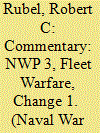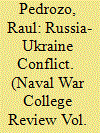| Srl | Item |
| 1 |
ID:
189572


|
|
|
| 2 |
ID:
189570


|
|
|
|
|
| Summary/Abstract |
Russia’s war in Ukraine is forcing a redrawing of global energy flows and a reevaluation of contemporary European security architecture. The war has pushed Europe into a brutal reckoning with its energy dependence on Russia, and European states’ turn toward cleaner energy technology and nuclear will diminish Russia’s place on the European continent, redirecting the latter’s attentions eastward.
|
|
|
|
|
|
|
|
|
|
|
|
|
|
|
|
| 3 |
ID:
189567


|
|
|
|
|
| Summary/Abstract |
Russia’s grand military strategy has a distinct maritime bent, the Ukrainian south coast is Russia’s most tangible strategic prize, and naval forces are crucial to holding it. Since the war’s beginning, Ukraine’s carefully planned strategy has applied stress to key elements of Russia’s maritime strategy, and Ukraine’s theory of victory is shaped by maritime considerations as thoroughly as Russia’s.
|
|
|
|
|
|
|
|
|
|
|
|
|
|
|
|
| 4 |
ID:
189569


|
|
|
|
|
| Summary/Abstract |
Western concern about Russian nuclear weapons’ potential deployment continues to suffuse policy responses to the Ukraine war, inhibiting relief efforts. Russia’s rhetoric and past exercises contribute to the pervasive Western belief that Russia might use nuclear weapons, including in a conflict that begins as a purely conventional war, to force its enemies to accept its terms.
|
|
|
|
|
|
|
|
|
|
|
|
|
|
|
|
| 5 |
ID:
189571


|
|
|
|
|
| Summary/Abstract |
Putin’s war of choice in Ukraine will continue to send shock waves across the shores of maritime Asia for years, with unfolding impacts on ecosystems inhabited by oil barrels, gas pipelines, submarine technologies, jet engines, and basing access, within a context of a China-Russia relationship characterized over the centuries by cycles of fear, temporary bonds, and renewed division.
|
|
|
|
|
|
|
|
|
|
|
|
|
|
|
|
| 6 |
ID:
189568


|
|
|
|
|
| Summary/Abstract |
Turkey’s prohibition of passage through the Black Sea straits by all foreign warships—including NATO’s—is difficult to justify under the Montreux Convention; Ankara more likely invoked it to mitigate repercussions from Moscow. Doing so tarnishes the country’s status as an honest broker and faithful guardian of the convention, which could have unintended long-term consequences.
|
|
|
|
|
|
|
|
|
|
|
|
|
|
|
|